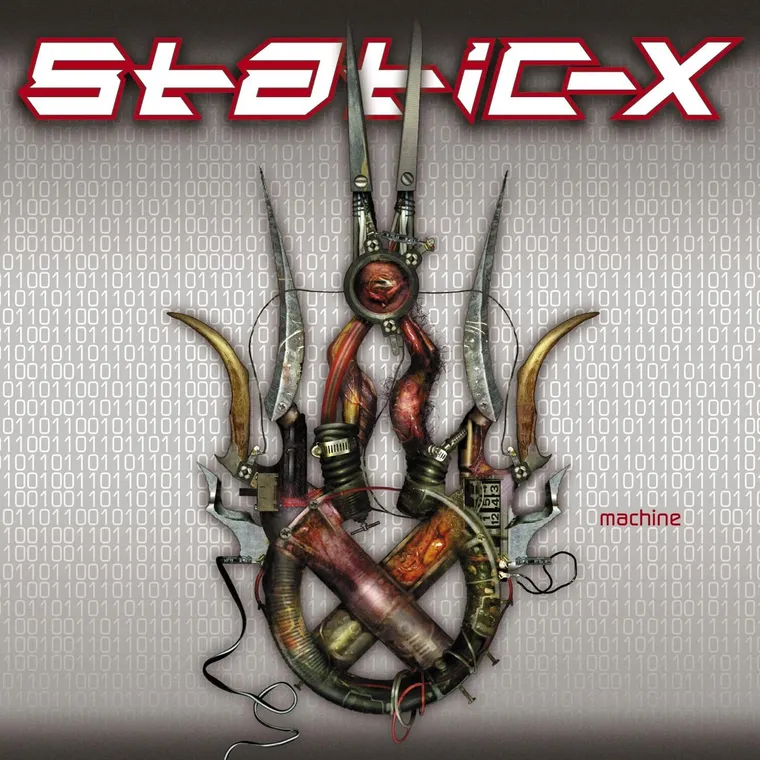Released on May 22, 2001, Machine marked a sharpened shift in Static-X’s already aggressive industrial-metal formula. Following the surprise success of their debut Wisconsin Death Trip, expectations were high—but rather than expand outward, the band dug deeper inward, delivering a leaner, meaner, and more tightly wound record that elevated their mechanical brutality to new heights.
Where the debut introduced listeners to their unique fusion of metal, electronics, and groove-laden riffs, Machine stripped away the chaotic edges in favor of colder precision. The result is an album that sounds less like a sequel and more like an upgrade—refined, calculated, and merciless in its intent.
Driven by a singular vision of rhythmic violence and synthetic intensity, Machine isn’t just an album—it’s an assembly line of perfectly engineered aggression.
The Refined Mechanics of Chaos
Opening with the brief but eerie “Bien Venidos,” Machine wastes no time before launching into its title track—a relentless, stomping groove-metal anthem that defines the album’s mission statement. With surgically executed riffs, robotic vocals, and a relentless pulse, “Machine” sets the tone for the rest of the record. It’s not chaos—it’s discipline. Every note is in place. Every rhythm is deliberate.
“Get to the Gone” follows with thrash-paced urgency, showcasing the band’s ability to shift gears without losing focus. The precision of the rhythm section locks in like a hydraulic press, while Wayne Static’s vocals punch through the mix with mechanized fury.
Throughout the album, guitarist and frontman Wayne Static favors minimalist riffs that rely more on rhythm and repetition than melody. This approach gives songs like “Black and White” and “This Is Not” their hypnotic, punishing drive. The band doubles down on its industrial edge, replacing any lingering traces of nu-metal groove with sheer mechanical power.
A Voice Like a Weapon
Wayne Static’s vocal performance on Machine is one of intensity and restraint. Rather than stretch into melody or falsetto, he leans into his rhythmic delivery, acting almost as another percussive instrument. His barked, syncopated lines drive tracks like “Permanence” and “Structural Defect,” where the vocals feel less sung and more delivered—a digital command broadcast through a corrupted feed.
And yet, within that calculated fury, there are moments of chilling introspection. “Cold,” the album’s most accessible single, slows things down just enough to expose the existential numbness at its core. Static’s delivery remains monotone and distant, but the lyrics and mood shift subtly, revealing the emotional detachment that runs like a circuit through the entire album.
It’s in these sparse, hollow moments that Machine reveals its darker soul—not angry, but empty. Not explosive, but drained.
Synthetic Atmosphere and Sonic Engineering
One of the most defining elements of Machine is its commitment to atmosphere. Guitarist Koichi Fukuda—returning to the band for this release—brings in layers of programming and synth textures that add depth without distracting from the core rhythm. These electronic touches aren’t flashy; they function like the hum of machinery behind closed factory doors.
The album’s production is razor-tight. Every drum hit is perfectly placed, every riff clipped for maximum impact. Tripp Eisen’s rhythm guitar complements Static’s locked-in approach, forming a dual-engine system that never veers off track. Bassist Tony Campos adds low-end grit, but like everything else here, it’s controlled—subtle, functional, and heavy.
Drummer Ken Jay keeps the beat relentlessly steady, offering industrial-strength backbeats that feel more constructed than played. His drumming doesn’t call attention to itself, but that’s the point. This is rhythm as machinery—steady, brutal, and reliable.
Mechanical Emotion and Post-Human Themes
While Machine never wears its heart on its sleeve, it’s not devoid of meaning. Its coldness is intentional. Its precision speaks to a world stripped of feeling, where technology and repetition have replaced vulnerability and spontaneity. Songs like “Otsego Undead” and “Burn to Burn” don’t just sound industrial—they feel post-human, built in a future where rage has been digitized and identity compressed into code.
Lyrically, Wayne Static rarely indulges in narrative. Instead, he delivers fragmented slogans—commands, confessions, warnings. It gives the album a surreal, hypnotic quality, as if every track is part of a broken transmission from a world running on loop.
The final track, “A Dios Alma Perdida,” abandons vocals altogether, offering a ghostly electronic outro that fades like power draining from a dying machine. There’s no crescendo, no conclusion. Just a quiet shutdown. Fitting, for a record that always felt more like a system than a story.
Standout Tracks:
- Machine
- Get to the Gone
- Black and White
- Cold
- This Is Not
- Otsego Undead
A Relentless Second Chapter
Machine is a bold declaration that Static-X wasn’t a fluke. Instead of expanding outward with their sophomore release, the band refined their identity, stripping away anything unnecessary and focusing on what made them stand out: tight rhythms, relentless groove, industrial noise, and razor-sharp precision.
It’s an album that doesn’t try to be everything—it knows exactly what it is and executes that vision with chilling effectiveness. The result is a record that sounds less like a band playing and more like a system functioning—impersonal, powerful, and unrelenting.
Where other albums aim to connect emotionally, Machine aims to overwhelm physically. Its grooves crush. Its rhythms punish. And its lack of compromise is what makes it so enduring.
Static-X’s Machine remains a cornerstone of industrial groove metal. Fierce, focused, and unapologetically mechanical, it strips emotion down to electrical impulse and replaces melody with momentum. For listeners who want their metal cold, clean, and crushing, Machine delivers—again and again, with brutal efficiency.

